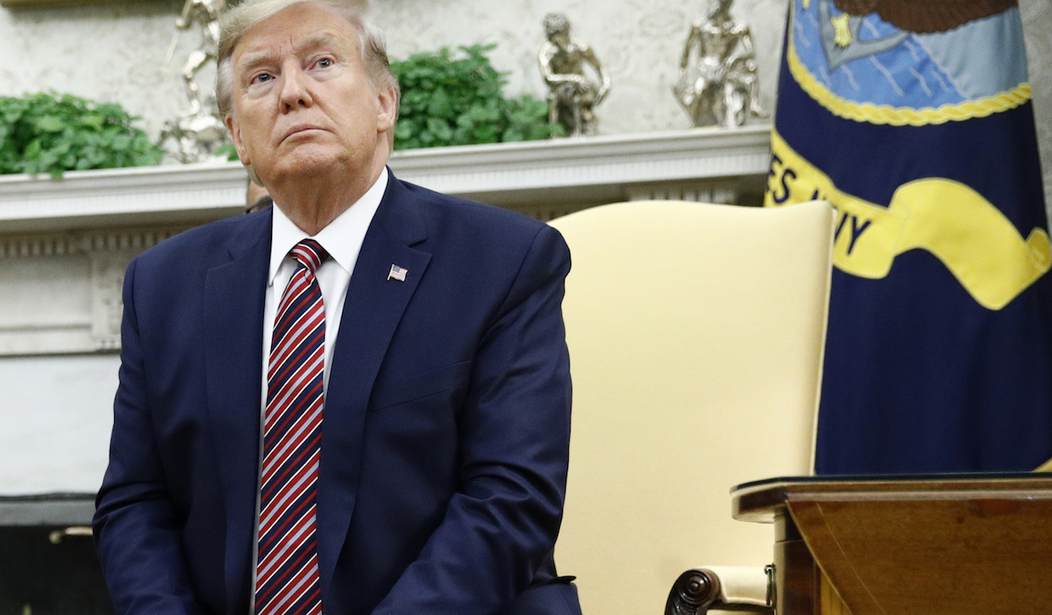This week, a distressing rumor started floating around our nation's capital. The Trump administration may reportedly scrap one of the most important provisions in the United States-Mexico-Canada Agreement in order to secure Democrats' support for the trade deal.
That'd be a terrible mistake. The provision in question would help accomplish one of President Trump's signature goals -- end the "foreign freeloading" that enables citizens of other countries to benefit from U.S. medical innovation without footing much of the research tab.
Caving to Democrats would put Americans last, not first. Let's hope the president stands strong.
Last year, President Trump and his Mexican and Canadian counterparts signed USMCA. If Congress ratifies the new trade deal, it'll replace NAFTA, the quarter-century-old pact that politicians in both parties have blamed for job losses and outsourcing. Economists estimate USMCA will create nearly 200,000 new jobs and grow the economy by about $70 billion.
USMCA vastly improves upon NAFTA in many ways. It helps our farmers by raising the amount of agricultural products they can sell abroad. It helps our manufacturing workers by raising wage and country-of-origin requirements. And it also helps our high-tech research companies by strengthening intellectual property protections for sophisticated "biologic" drugs.
Biologics are a unique -- and very complex -- class of medicines made from living organisms. Already, doctors use biologics to treat blindness, diabetes, and more. Eventually, the FDA believes these cutting-edge treatments may offer the "most effective means to treat a variety of medical illnesses and conditions that presently have no other treatments available."
Recommended
Developing these treatments is an expensive process riddled with failure. Often, it can take more than a decade and close to $3 billion to turn a promising compound into a marketable medicine. Only one in 10 drugs that begin clinical trials ultimately secures FDA approval.
The United States encourages innovators to pursue these risky projects by offering strong intellectual property protections. Right now, federal law prevents generic drug companies from accessing biologic innovators' clinical data for 12 years. This gives innovators time to recoup their development costs without competing against unfair knockoffs.
Other nations don't value drug innovation like we do. Canada currently offers U.S. biologic innovators just eight years of data protection. Mexico has no safeguards in place whatsoever.
As a result, Mexican and Canadian generic firms can rip off U.S. innovations without putting in the time and resources that America firms invested. These weak intellectual property protections help explain why other countries enjoy lower drug prices -- they simply steal our research and create cheap knockoffs.
USMCA would prevent this abuse. It requires both nations to grant U.S. innovators a full decade of biologic data protection.
This reform will give our domestic innovators confidence to pour more money into research and development, secure in the knowledge that foreign competitors won't steal their inventions. We'll wind up with more breakthrough drugs for patients, including those suffering from currently incurable diseases. The provision will also create more jobs for U.S. scientists.
And it'll establish an important precedent for other, future trade deals -- no longer will Americans accept foreign freeloaders mooching off U.S. companies' research investments.
Unfortunately, House Speaker Nancy Pelosi and some of her fellow Democrats are trying to stall the deal's passage. Reluctant to give President Trump a political victory, some Democrats claim the biologics provision will raise drug prices for American patients. That's patently absurd. The United States already grants 12 years of biologic data protection. Lengthening protections in Canada and Mexico wouldn't impact U.S. drug prices.
Let's hope President Trump ignores this scaremongering and sticks to his guns. It's time to end foreign freeloading.
Stacy Washington is a decorated Air Force Veteran, an Emmy nominated TV personality, and the host of the nationally syndicated radio program "Stacy on the Right."

























Join the conversation as a VIP Member